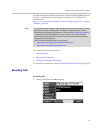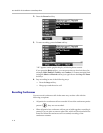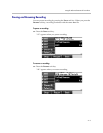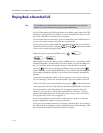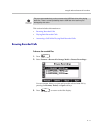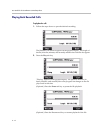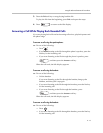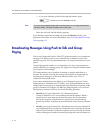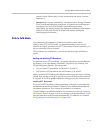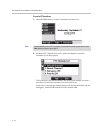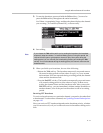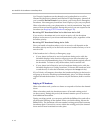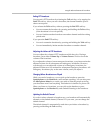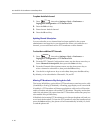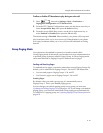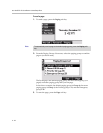
Using the Advanced Features of Your Phone
4 - 15
placed on hold. Phones play Priority broadcasts at the phone’s current
audio level.
• Emergency (for Group/Channel 25)—Broadcasts sent to Group/Channel
25 are considered Emergency broadcasts. All phones receive Emergency
broadcasts (even if Do Not Disturb is enabled), and play them
immediately. By default, phones play Emergency broadcasts at the highest
audio level. The audio level will return to normal for subsequent
non-Emergency broadcasts.
Push-to-Talk Mode
Your phone may be enabled to operate in a broadcast mode called
Push-to-Talk (PTT). In PTT mode, you broadcast messages on a specific
channel. In order to send and receive PTT broadcasts on certain channels, you
have to subscribe to those channels.
PTT broadcasts are collaborative: you can transmit messages and listen to
replies.
Sending and Receiving PTT Broadcasts
To send and receive PTT broadcasts, you need to subscribe to certain channels.
By default, you’re subscribed to Channels 1, 24 (the Priority channel), and
25 (the Emergency channel). This means that:
• You can send PTT broadcasts on Channels 1, 24, and 25.
• You’ll receive PTT broadcasts sent on Channels 1, 24, and 25.
When you end a PTT broadcast, the channel remains open and enters a waiting
period. This waiting period gives people who received the broadcast a chance
to respond. If no one responds within the waiting period, the channel closes.
Sending PTT Broadcasts
If you send a PTT broadcast without specifying a channel, it’s automatically
transmitted on the default channel. Channel 1 is the default channel that all
broadcasts transmit on, if no channel is specified for a broadcast.
You can change your default channel to any channel you want (see Updating
the Default Channel on page 4-19). If you change your default channel, you’ll
become subscribed to that channel automatically. To subscribe to a channel,
see Updating Channel Subscriptions on page 4-20).



